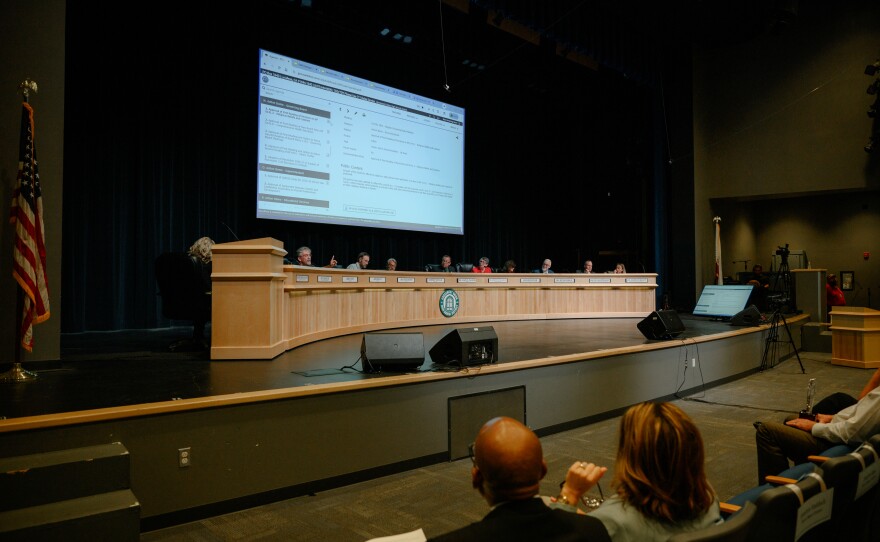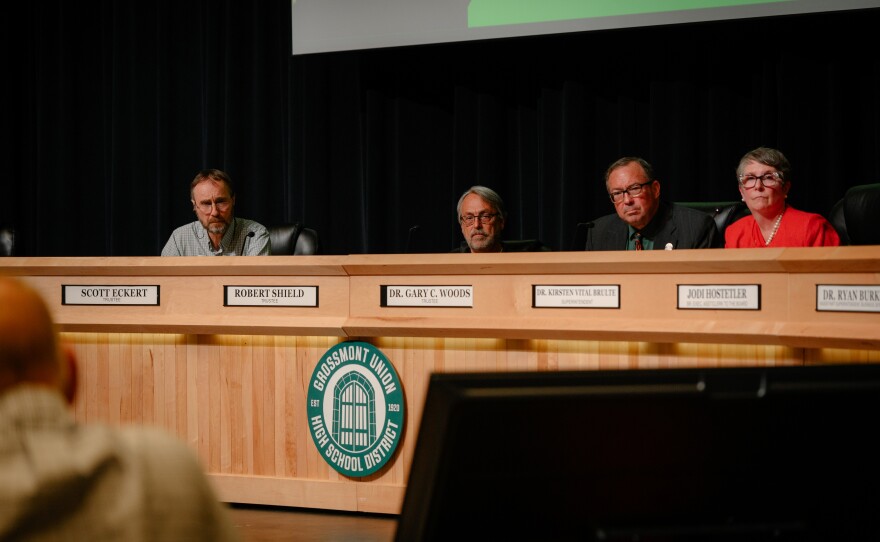Grossmont Union High School District students returned to school campuses in August, but for the first time no teacher librarians welcomed them back.
West Hills High School senior Lillian Zehnder had a strong connection to the library space created by Suzanne Sannwald, the school's librarian.
When Zehnder came back this semester, she could feel Sannwald’s absence.
“It's completely changed,” Zehnder said. “Most of the work that our librarian put into it, like, displaying artwork, a lot of her references, recommendations, that's all almost completely gone, because it went with her.”
Grossmont Union High School District eliminated all of the district’s teacher-librarian positions in March, moving some of them into classrooms to teach subjects like English or history.
Since then, the district has replaced the librarians with library technicians. The technicians don’t have the same authority or knowledge and teaching experience required of teacher librarians.

Earlier this month, the board majority followed up their March decision by approving one district librarian position to oversee all libraries in the district. That librarian will report to an official in the district office.
Teachers and students have said this decision further exacerbates concerns about the board’s increasing influence on libraries and classrooms.
Limited library access
The former teacher librarians were trained and qualified to supervise students, offer research guidance, maintain and update book collections and even teach when needed.
The duties of the library technicians who now staff the school libraries are mostly limited to checking out books and maintaining collections.
Students said this means they can’t gather or study in the library, unless additional credentialed staff is present. They've also said library hours fluctuate.
“A lot of the times, it’s been closed — most of into lunch and at fourth period, which for me, those are like the times that I can go to the library, because all of my other classes are like, we're doing stuff until the bell,” said Kairo Jones, Granite Hills High School junior.
“Now, if I just go in and I say, ‘Oh, do you have any books on the Great Depression?’ The technician doesn't really know.”
Have a tip? 📨
The Investigations Team at KPBS holds powerful people and institutions accountable. But we can’t do it alone — we depend on tips from the public to point us in the right direction. There are two ways to contact the I-Team.
For general tips, you can send an email to investigations@kpbs.org.
If you need more security, you can send anonymous tips or share documents via our secure Signal account at 619-594-8177.
To learn more about how we use Signal and other privacy protections, click here.
Zehnder said when she does go to the library, it’s a completely different experience.
“I planned on joining one of my friend's clubs this year, however, it was shut down because it was in the library and they needed the stuff that they had in the library, so that was disappointing,” Zehnder said.
The district declined a KPBS request for an interview. But in an emailed statement, a district official acknowledged the student complaints regarding library access.
“As is natural during a period of transition, we have been addressing some misunderstandings regarding library operations ... To our knowledge, students have access to the library throughout the day, except for brief periods when a Library Technician may be on break or lunch.”
Aimee Korynta, president of the California School Library Association, said one district librarian won’t come close to replacing the work of nine teacher librarians.
“Teacher librarians create welcoming spaces in their libraries. They ensure that students are served social-emotionally, but also, you know, academically,” Korynta said. “So, that is definitely not the role of a district librarian. It is far more administratively driven.”
In its emailed response to KPBS, the district said, “With the elimination of school-based library positions this past spring, the District must still ensure compliance with the Education Code. The Board’s approval of the District Librarian job description provides a path to meet that obligation.”
Impact on literacy
Teachers have said the barriers to libraries hinder efforts to improve overall literacy in the district.
Many students in the district are not meeting English Language Arts standards, according to state measures of grade level standards. This includes close to half of the students in the district who are classified as English learners.
Barbra Ruggles, West Hills High School English teacher, said English teachers are trying to improve literacy by updating curriculum to engage students.
The district has outlined guidelines for the book review process. Ruggles and other teachers have submitted requests to the district to approve new literature books for classroom teaching, but they say the requests have been stalled.
“When you refuse to approve titles that would improve our literacy of our students by making them engaged in the reading process, I think we run into some roadblocks here,” Ruggles said.
A district official said the instructional materials review process needs clarification and said that is one of the goals for this year.
The district also outlined a goal to support “enhanced technology literacy.”
As California has updated its media and information literacy requirements with evolving technology, Korynta said teacher librarians are usually the school staff who help school districts meet those requirements.
“Teacher librarians are responsible for teaching media literacy, information literacy,” Korynta said. “I think having a district librarian who is removed from the school setting really makes or puts the responsibility onto this classroom teacher, which, of course, they're content specialists, not information specialists.”
District officials have suggested that teacher librarians who’ve been transferred to classrooms could fulfill a dual role of teaching a subject and increasing literacy.
But teachers say having welcoming libraries is necessary to improving literacy.
“I don't see how it could be effective,” Ruggles said. “I mean, we had an amazing teacher librarian, and quite honestly, like our library looks sad right now. Students are no longer interested in going into that space.”
Censorship concerns
Teachers, students and former librarians have said the board majority’s actions speak to a larger conservative political agenda.
An investigation earlier this year by the San Diego Union-Tribune revealed private text threads that included members of the governing board’s conservative majority — Scott Eckert, Robert Shield, Gary Woods and Jim Kelly.

Among other things, the text messages focused on ending DEI, reducing the number of librarians and freezing library funds.
One text said, “freeze all library funds and micromanage all library purchases.”
Another talked about “making a process, which would be impossible for ‘woke’ books to be adopted.”
Jason Balistreri, Mount Miguel High School’s former librarian who is now a history teacher, said these texts make the board majority’s intentions clear.
“Definitely, it seems like there is an ideological agenda. And it's like a full front battle on many fronts,” Balistreri said. “It feels like they're attacking public education and they are.”
KPBS reached out to all four board members included in the text threads for an interview but did not hear back.
After the text messages were made public, Sandra Huezo, who was the district’s superintendent at the time, denied connections between the recommended cuts and the text threads.
“Regardless of any conversations that may have occurred without my involvement or knowledge, one fact remains: my proposals were based on my professional judgment and were made in the best interest of students.”
The district has publicly outlined goals to build a culture of trust and collaboration. But students and teachers who have spoken out against the governing board remain frustrated.
“I think that they're just trying to give us a way to not have anything to complain about, even though what they're doing is not going to be helpful,” Jones said. “They're just trying to get us to shut up.”
District officials have not said when they plan to hire the district librarian.
- Embattled animal services official no longer employed by county
- SANDAG board questions Border Patrol access to local law enforcement data
- The plan to build a massive data center in Imperial County — without environmental review
- Apology letter raises new questions about county animal shelter official’s profane voice message





